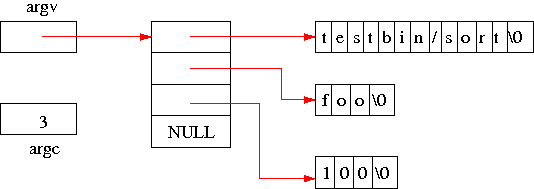There are many OS/161 applications that you can use
to test your kernel.
The source code for many of these applications can be
found under os161-1.11/testbin. Some other
applications live under os161-1.11/bin
and os161-1.11/sbin.
You build all of the OS/161 application programs when
you run make in the directory
cs350-os161/os161-1.11. When you do this,
the application program executable files are copied
into cs350-os161/root/testbin (or root/bin
or root/sbin).
Once your OS/161 kernel has booted, you can launch an
application program using the p command from
the kernel menu. For example, to run the palin
program, which is located in testbin, use the
following command
OS/161 kernel [? for menu]: p testbin/palin
As usual, you can pass commands to the kernel on sys161
command line, e.g.,
sys161 kernel "p testbin/palin"
Be sure to see the next note, about modifying your kernel
We would like to be able to autotest your submissions by scripting
and running commands like this (and like the others shown above):
% sys161 kernel "p testbin/palin;q"
The idea is that this should first launch the palin application
from testbin, and then, when palin is finished,
shutdown the kernel using the q command.
Unfortunately, these kinds of commands will not work in OS/161
as it is provided to you. The problem is that after creating
a new thread to run the palin program, the main kernel
thread will immediately read the next command without waiting
for the palin application to finish running.
In this case, the next command is q, which means that
the kernel will shut down immediately, probably before palin
has finished running. This is not the behaviour we want.
For this reason, you need to modify the way the kernel launches programs
when it receives a p command.
After the main kernel thread gets the p command and launches
a new thread to run the application program, the main thread should
wait for the new thread to finish before continuing to read and
process the next kernel menu command.
A good place to make this change is in the common_prog
function in kern/main/menu.c, since that is where the
main kernel thread launches a new thread to run the application.
Once you have implemented the kernel changes needed
for waitpid, it should be relatively easy for you to
modify common_prog so that the main thread will wait
for the newly-created thread.
In the meantime, here is a simple (but not very elegant)
way to change your kernel so that the main kernel thread will
wait for launched application programs to finish.
Two changes are needed. In the common_prog function,
just before the function returns, add the following code:
#if OPT_A2
while (!one_thread_only()) {
clocksleep(1);
}
#endif /* OPT_A2 */
Also, don't forget to add #include "opt-A2.h" to the top
of kern/main/menu.c so that this change will take effect.
The second change is to add the one_thread_only function
to kern/thread/thread.c, like this:
#if OPT_A2
/*
* returns true (1) if the number of threads in the system is
* equal to 1, otherwise returns fals (0).
*
* See the usage note in thread.h
*/
int
one_thread_only() {
int s;
int n;
/* numthreads is a shared variable, so turn interrupts
off to ensure that we can inspect its value atomically */
s = splhigh();
n = numthreads;
splx(s);
return(n==1);
}
#endif /* OPT_A2 */
and a corresponding function prototype in
kern/include/thread.h:
#if OPT_A2
/*
* returns true (1) if the number of threads in the system is
* equal to 1, otherwise returns fals (0).
*
* Usage Note: if this function returns 0 (false), the actual thread
* count in the system may have changed by the time the calling
* function is able to use the returned value. Thus, a return value
* of 0 provides little information to the caller.
* However, if the return value is 1 (true), then the calling thread
* is the only thread in the system. Unless the caller itself
* creates new threads (or unless the kernel spontaneously lauches
* new threads, e.g., in response to interrupts), the caller will
* know that it is the only thread in the system.
*/
int one_thread_only(void);
#endif /* OPT_A2 */
Again, don't forget to include opt-A2.h in both
thread.c
and thread.h.
After making these changes, rebuild your kernel (make depend,
make,
make install). When you run the new kernel and launch an
application program from the kernel menu with the p command,
you should find that the kernel does not prompt for new command
until the launched application has finished.
Again, this implementation is just intended to be a stopgap until
you have made enough progress on your kernel to allow you to make
the main thread wait specifically for the new application thread
that it launches.
You're not required to use this implementation. However, you must
ensure somehow that the main kernel thread waits.
Doing so will make your own testing easier, and without that change
we will not be able to autotest your code.
